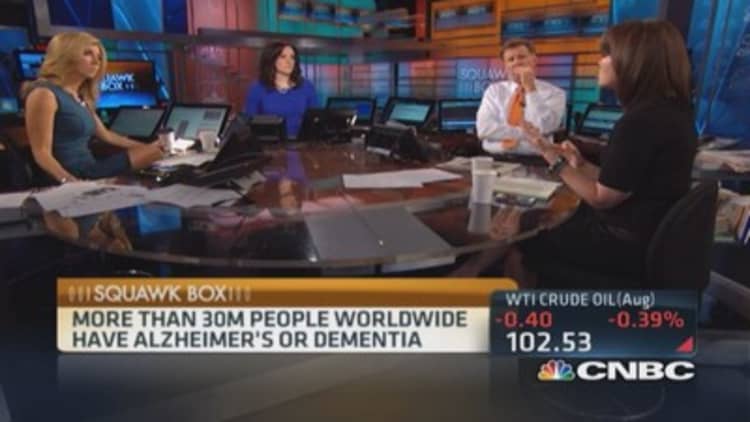
As the Alzheimer's Association International Conference kicks off Saturday in Copenhagen, Denmark, one thing is clear: There is a tremendous public health need for Alzheimer's treatments, but efforts have stalled in the past few years as high-profile programs failed in their late stages.
More than five million Americans have Alzheimer's disease, the sixth-leading cause of death in the U.S. Worldwide, 35.6 million people have either Alzheimer's or dementia, according to the World Health Organization. Those numbers are expected to triple by 2050.
Exactly what causes the disease is unknown, though it's clear that it's associated with a build-up of plaques in the brain.
Read MoreBrainteaser: Can an iPad game detect Alzheimer's?
Researchers at the conference will present data on where things stand against the disease.
"We've made a lot of progress over the past five to 10 years in a couple of areas," Maria Carrillo, the association's vice president of medical and scientific relations, said in a telephone interview Friday from Copenhagen, citing technology for early detection, understanding of risk factors, and—to some extent—therapeutics.
Despite recent setbacks, drugmakers are still working in the space, with 67 medicines currently in development, according to the industry group Pharmaceutical Research and Manufacturers of America, or PhRMA. That's up from 22 in 2004. There are currently five medicines on the market for Alzheimer's, though they only target the symptoms, rather than the underlying cause of the disease, according to the Alzheimer's Association.
Read MoreTraders' brains have bubble detectors: Researchers
Pfizer, Johnson & Johnson, GlaxoSmithKline, Biogen Idec, Roche/Genentech, Eli Lilly and Merck are among companies with the biggest pipeline focus on Alzheimer's. Their efforts mainly aim to clear or prevent plaques called amyloid beta from building up in the brain.
After programs from Lilly and Pfizer, J&J and Elan Pharmaceuticals failed in 2012, efforts have shifted to attempting to treat Alzheimer's earlier in the course of the disease.
Beyond needing a better understanding of the biology, other problems persist in Alzheimer's drug development. Late-stage trials still take five to six years because of difficulty enrolling and the period of time required to observe change in patients, Carrillo said. And while U.S. federal funding for Alzheimer's research got a $122 million boost this year, the National Institutes of Health still allocates about $600 million to the disease, compared with more than $5 billion for cancer, she pointed out.
Read MoreCreate financial and legal plans to manage Alzheimer's
"We've actually changed the trajectory of life expectancy for cancer, we did the same thing for heart (disease), and certainly did the same thing for HIV," Carrillo said. The spending on Alzheimer's and dementia, she said, "is not commensurate with the disease."
Among the 67 medicines in development, here's where drugmakers stand:
Alzheimer's drugs: Where things stand
| Drugmaker | Number of Drugs in Development<br> for Alzheimer’s |
|---|---|
| Johnson & Johnson | 3 |
| GlaxoSmithKline | 3 |
| AstraZeneca | 2 |
| Pfizer | 2 |
| Biogen Idec | 3 |
| Eisai | 2 |
| Otsuka | 2 |
| Roche/Genentech | 3 |
| Eli Lilly | 3 |
| Merck | 2 |
| Takeda | 2 |
| Sanofi | 1 |
Source: Source: PhRMA; Some drugs are partnerships between drugmakers.
—By CNBC's Meg Tirrell

